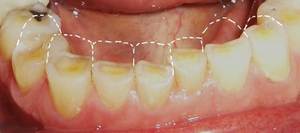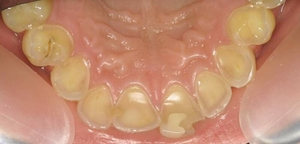Dental erosion is physical damage to enamel or dentine tooth structure by the chemical effect of acids. These can be acids from dietary causes (extrinsic acids) or from the stomach acids (intrinsic acids). The acid causes the dissolution of enamel and if unprotected, the dentine. This is a seperate process to tooth decay (dental caries), tending to happen over the surface of a tooth. Our diets have become more acidic over time and erosion is becoming more of a problem. It causes physical damage to the tooth and can be very difficult to repair. The tooth enamel provides a protective mechanism, so when it is worn, the tooth is more exposed. This can lead to dentine hypersensitivity, what is commonly referred to as sensitive teeth.
Dietary Acids Causing Dental Erosion
Many foods and drinks are acidic. Our saliva is able to counteract the acid and remineralise the damaged tooth structure, if there is a mild to moderate amount of acid intake. With higher acid intake, the saliva can no longer buffer the acid (counteract the effect) and so the damaged tooth structure is irreversibly lost. The more acidic the food, the more damage it can do.
The common culprits of dietary acids are varied. Fruit juices and fizzy drinks are particularly bad, as they are often consumed without food, so our body does not interpret their consumption as eating. We don’t produce extra saliva to help counteract their effect, like we would if they are consumed with a meal. It is best, therefore, to keep these to a minimum. Certainly try to avoid them as a snack outside mealtimes. For juices, it is good practice to top them up with some water, to help dilute the acid. For fizzy drinks, remember, even if they are diet drinks, the carbonation is acidic and so they are damaging. Artificial sweeteners are acidic, so diet soft drinks are more acidic than mineral water. Soda water has bicarbonate of soda, so is less acidic than sparkling water. For all acidic drinks, drinking through a straw helps to bypass the teeth. There is a particular risk for people, usually children, that get into a habit of pushing the drink between their teeth as they enjoy the sensation of the carbonation between their teeth. This often leads to decay as well as erosion.
Citrus fruits are also very acidic. They should be consumed in moderation. Many people consume lemon juice for its supposed health benefits. Unfortunately, the benefits are poorly documented and the damage to the teeth is well documented. Small amounts of lemon juice added to food for flavour is fine, but consuming daily lemon juice as a drink is bad for the teeth. Remember, even fruits that taste sweet, can have a high level of acidity, this is just outweighed by the sugar hitting our tastebuds. Kiwi fruit is very high in acids, but tastes sweet. Apple juice can be more acidic than orange juice, but tastes sweeter. Vitamin C is in fact an acid, ascorbic acid. Vitamin C tablets that are chewable can be problematic. Capsules that are swallowed are better as they bypass the teeth. Again, taking Vitamin C preventively does not have much benefit, unless you are low in Vitamin C.
Remember, diets which recommend alkaline blood levels are not talking about the acid level in the food. Acidic foods, such as lemon, can be called “alkaline” by these diets, even if it is acidic in the mouth. The body already regulates acid levels very well and consuming different foods to try to affect this does not have a significant impact.
Beer and wine are also acidic and should be consuned with moderation. Having cheese with wine can help to neutralise the acidity. Over chlorinated swimming pools can cause erosion also. Berries and vegetable juices can be quite acidic and all bitter and sour foods like vinegar should be consumed in moderation. Remember, foods that are health, such as a salad with tomatoes, balsamic vinegar and garlic dressing, can be acidic and then lead to reflux! Everything in moderation and balance is the key. Asthma inhalers are acidic, so if used incorrectly, they can be a cause of dental erosion. Some mouthwashes are also acidic, such as Difflam. These are not designed for everyday use.
Stomach Acids Causing Dental Erosion
Stomach acids can cause erosion when they enter the mouth. Even if there is no entry to the mouth, nausea can lead to more acidic breath, which reduces the saliva’s ability to counteract mild dietary acids. Those with stomach problems can be at high risk of erosion. GORD (GERD in USA) – gastro oesophageal reflux disease, or simply, reflux can be a big cause of erosion. Reflux is stomach acids leaking into the oesophagus from the stomach. It can be caused by a hernia or poor muscle tone of the stomach constrictors. It can also be caused by reactions to foods, such as those with lactose intolerance or irritable bowel syndrom (IBS). For those with a gastric ulcer, similar problems occur. Frequent heartburn can be a symptom of these diseases, so if you suffer from stomach problems, it is best to see your doctor to have it investigated, for your general health, not just for your teeth.
Sometimes reflux can be silent reflux (laryngopharyngeal reflux). This is stomach acids entering the oesophagus, but not causing pain or heartburn. Sometimes it presents as frequent small burps of air, which get trapped in the stomach. There is often a cough or hoarsenss. Even though there is no pain or discomfort, the same level of damage can occur, both to the oesophagus and teeth.
Pregnancy can be a big cause of vomiting and nausea. This “morning sickness” can be associated with triggers or foods and can occur at any time of the day. It is sometimes difficult to brush due to increased gag reflex. Some find using less toothpaste or a non-foaming toothpaste can help. Others have to abandon toothpaste altogether (speak to your dentist about alternatives, like Tooth Mousse). It is important that you still maintain oral hygiene and your dentist can discuss techniques which can help, if you find oral hygiene problematic.
Induced vomitus can be a very damaging habit. Some people get into the habit of rechewing partially digested food. They regurgitate parts of their food and then rechew and swallow. This is very damaging and should be ceased.
Eating disorders, such as bulimia nervosa, lead to stomach acids damaging the teeth. The pattern of acid wear is often typical, with profound erosion along the inside (palatal surfaces) of the upper front teeth. The lower teeth often are undamaged as the tongue covers and protects them while the acid is present. Pooling saliva does not help to remineralise the upper teeth. Often a dentist is the first step in diagnosing an eating disorder in teenagers. They usually see their dentist routinely, even when healthy. When the dentist notes erosion far in excess of expected wear for their age, they will discuss with the patient, and if appropriate their parent. They will be looking to identify if there is another cause that would explain the wear. They will discuss any recent weight loss, attitudes to food and diet as well as self image and problems at school. Often there may be erosion due to just dietary factors, but it should be considered as the physical damage to the teeth may present before any other health problems.
What can I do about dental erosion damaging my teeth?
The first step is to identify the cause of dental erosion. This should then be reduced or, where possible, eliminated. If it is dietary, the amount consumed should be reduced or diluted. If it is from the stomach, medical treatment to reduce it is warranted. This may be as simple as a course of antibiotics for an ulcer, or taking daily tablets to reduce stomach acid. It may require therapy, if psychological problems are the cause.
Using a toothpaste that protects against erosion is a good idea, such as Pronamel, by Sensodyne. They are specially formulated to help. Adding Tooth Mousse application to your daily hygiene regimen is also useful. Drinking plenty of water helps to dilute the acids. You should NOT brush your teeth after any acid attack. The enamel is weaker and you can damage it further. This is called tooth brush abrasion. It can occur without acids, so you should always brush gently. After the acid, wait at least half an hour, but waiting an hour is better, before brushing. Ensure that you are getting sufficeint calcium in your diet and staying well hydrated. This allows your saliva to be at its optimum benefit.
For any exposed dentine, bonding some composite filling to the area helps. This can occur at the neck of the tooth and can be accelerated by abfraction from grinding and recession from gum disease. Your dentist will be happy to make recommendations based on your particular set of circumstances.

